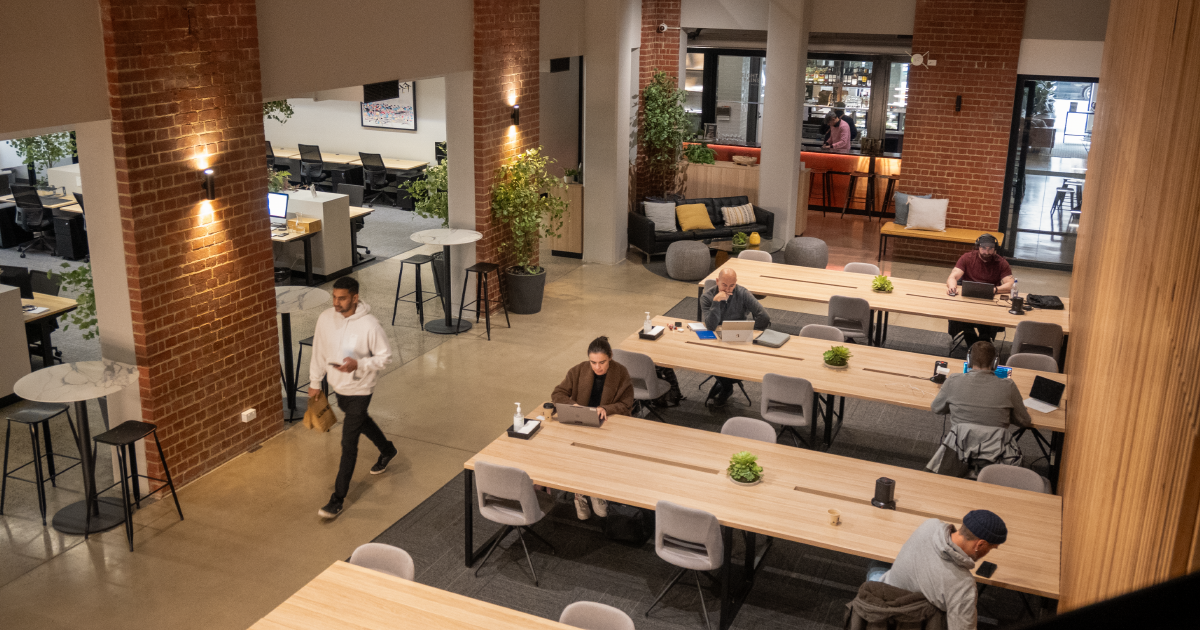
In the rapidly evolving landscape of modern work, many professionals are faced with pivotal decisions when it comes to their workspace. Should they opt for the comfort and familiarity of a home office? Or venture into the dynamic realm of coworking facilities?
The choice between coworking and home office has become a burning topic of discussion among freelancers, entrepreneurs, and remote workers alike. Each option presents a unique set of advantages and challenges, catering to diverse work styles and preferences. In this blog, we delve deep into the realm of coworking facilities and home offices. We will explore the pros and cons of each. Helping you determine which environment best suits your individual needs and professional aspirations.
So, join us as we embark on an insightful journey to discover the ideal workspace that fuels productivity and ignites inspiration!
What is the difference between coworking facilities and home offices?
The primary difference between a traditional office and a coworking space lies in their setup and the way most people utilize them for work. A traditional office is usually a dedicated space owned or leased by a single company or organization. It is designed and managed specifically for the employees of that particular company.
A coworking space, on the other hand, is a shared space or shared workspace that accommodates individuals and businesses from different companies. Furthermore, it is typically operated by a third-party provider, and people from various professions and industries work together in the same open or private spaces.
Leasing or owning an office space often involves long-term commitments and contracts, which may tie a company to a particular location for an extended period. Coworking spaces offer more flexibility, as they allow members to choose from various membership options, such as daily, weekly, monthly, or even pay-as-you-go plans. This flexibility is especially beneficial for startups, freelancers, and remote workers who prefer adaptable arrangements.
Coworking VS Home Office
When it comes to coworking versus home office, traditional home offices often come with higher upfront costs, including rent, utilities, maintenance, and furnishing expenses, making them a significant financial commitment. Coworking spaces typically offer cost-effective solutions. Members pay for the workspace they need, avoiding the overhead costs associated with maintaining a full office.
In a traditional office, employees mainly interact with colleagues from the same company, limiting networking opportunities in professional life to an extent. However, coworking spaces foster a diverse and collaborative community of professionals. Moreover, working from home or alongside individuals from various backgrounds can lead to enhanced networking, skill-sharing, and potential business partnerships.
Additionally, traditional companies must independently arrange and manage facilities and services like conference rooms, private offices, printing, and refreshments. Coworking spaces typically provide fully equipped amenities, such as conference rooms, dedicated desks, high-speed internet, printers, and kitchen areas, and often organize community events or workshops, creating a more convenient and supportive work environment.
Moreso, traditional offices offer a controlled environment tailored to a specific company’s culture and branding. Furthermore, coworking spaces promote a more dynamic and vibrant atmosphere, a familiar environment where individuals from diverse backgrounds coexist, fostering creativity and innovation.
In summary, the choice between an office and a coworking space depends on individual preferences, the nature of the work, and the specific needs of the business owner or professional.
Read More About Exploring the Benefits of Shared Workspace Over Traditional Office
What are the advantages of coworking facilities?
Coworking offers several advantages that make it an appealing option for a wide range of professionals. Here are some of the key advantages of coworking facilities:
1. Cost-Effective
Coworking facilities provide cost-effective solutions, particularly for freelancers, startups, and small businesses. Members can choose from flexible membership options that suit their needs and budget. They can avoid the high upfront costs of leasing or owning a traditional office.
2. Coworking Facilities Offers Flexibility
Coworking spaces offer a level of flexibility that traditional offices cannot match. Members can choose to work remotely on a daily, weekly, or monthly basis, or even opt for a pay-as-you-go model. Following, this flexibility allows individuals to adapt their workspace to their changing needs and schedules.
3. Networking Opportunities & Enhanced Productivity
Coworking spaces foster a diverse and vibrant community of professionals from various industries. Furthermore, working alongside other professionals and like-minded individuals opens up excellent networking opportunities, leading to potential collaborations, partnerships growing business together, and valuable connections. Coworking environments can be highly conducive to increased productivity on personal tasks. Furthermore, surrounded by motivated and focused individuals, members often find themselves more inspired, stay focused, and driven to accomplish their tasks.
4. Community and Support
Being part of a coworking community provides a sense of belonging. It reduces the isolation that can come with remote work or freelancing. Members can engage in social activities, workshops, and events, creating a supportive and encouraging atmosphere.
5. Coworking Facilities Includes Amenities and Services
Coworking facilities are well-equipped with various amenities, such as high-speed internet, conference rooms, printing facilities, and fully stocked kitchen areas. These amenities save members the trouble of commuting time setting up their own space and managing their office infrastructure.
6. Location and Accessibility
Coworking spaces are often strategically located in city centers or business districts. This offers easy accessibility to transportation, restaurants, and other amenities. Furthermore, this prime location can be advantageous for meetings with clients or partners.
7. Flexibility to Scale
For growing businesses, coworking spaces provide the flexibility to scale up or down as needed. Additional coworking memberships can be easily obtained, and if the business grows and team size reduces, memberships can be adjusted accordingly.
8. Inspiring Work Environment
Coworking facilities are designed to be visually appealing and inspiring. The well-designed interiors and collaborative atmosphere can positively impact creativity and motivation. Moreover, coworking facilities often provide access to professional meeting rooms and event spaces. This is beneficial when hosting client meetings, workshops, or other professional networking events. Overall, coworking offers a blend of affordability, flexibility, and a supportive community. Moreover, this makes it an attractive option for modern professionals seeking a productive and engaging work environment.
Read More About Ten Reasons Why Coworking Will Be Back In 2024
Why is coworking beneficial for new business?
Coworking facilities can be highly beneficial for new businesses in various ways. For new businesses with limited budgets, coworking spaces offer a cost-effective alternative to leasing or owning a traditional office. Coworking memberships are often more affordable and come with inclusive amenities tax benefits and services, saving on overhead costs.
Startups may face uncertainty in the early stages, and long-term office leases can be risky. Coworking provides flexible membership options, allowing new businesses to adapt their workspace according to their evolving needs without being tied down by long-term contracts.
Coworking spaces are buzzing with professionals from diverse industries and backgrounds. This vibrant community creates a professional environment with ample networking opportunities for new businesses, helping them build valuable connections, partnerships, and potential clients.
Coworking spaces foster a collaborative atmosphere, promoting interaction, knowledge-sharing, and idea-sharing among members. This professional environment also can lead to innovative solutions and opportunities for startups to collaborate on projects or seek advice from other experienced professionals in the professional space.
In terms of coworking facilities vs. home offices, coworking spaces often provide access to amenities and resources that might be challenging for new businesses to set up independently. These may include high-speed internet, meeting rooms, event spaces, and other office equipment and infrastructure. Being associated with a reputable coworking space can lend a professional image to new businesses. Moreso, it provides a credible and established address for meetings with clients, investors, and partners.
Coworking Spaces at United Co.
A coworking membership at United Co’s collaborative workspace in Melbourne offers a great opportunity to connect with like-minded professionals. Our flexible membership options allow you to access your dedicated desk or hot desk space whenever you need it, enabling you to work the way you prefer. If you are interested in booking a tour of our coworking space, get in touch today!



